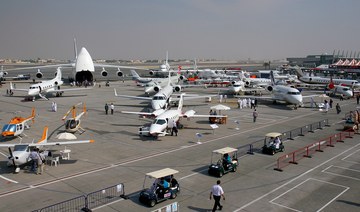RIYADH: Saudi Arabia is set to finalize a comprehensive systematic plan to address the environmental sustainability of the civil aviation sector, a top official said.
The Civil Aviation Environmental Sustainability Plan, currently in development by the Saudi General Authority of Civil Aviation, aims to address the environmental impact linked to the anticipated growth in the country’s civil aviation sector.
The plan is designed to align with international commitments outlined in the Paris Climate Agreement and the emission reduction goals of the International Civil Aviation Organization.
Abdulaziz Al-Duailej, president of GACA, said: “The program encompasses various matters, including greenhouse gas emissions, in accordance with a set of measures and practices that align with the highest international standards. This is aimed at achieving the Kingdom’s goal of zero emissions by 2060.”
He made these remarks during the third ICAO Conference on Aviation and Alternative Fuels, hosted by the Civil Aviation Authority of the UAE, in Dubai last week.
The CAESP is poised to address critical concerns, particularly the reduction of greenhouse gas emissions.
Heading the Saudi delegation at the conference, Al-Duailej emphasized the Kingdom’s support for inclusive and impartial policies. These policies are designed to offer equal opportunities for diverse methodologies and technologies, promoting a neutral approach toward energy sources and types of aviation fuel.
This development positions Saudi Arabia as a key player in the global sustainability push and reflects a broader commitment to environmentally conscious business practices in the region.
Al-Duailej highlighted that Saudi Arabia has taken significant steps in developing infrastructure and supply chains for hydrogen fuel, aiming to become a key producer and exporter.
In his address, the GACA president underscored the leadership of Saudi Arabia in environmental protection, both within the framework of the ICAO, the UN Framework Convention on Climate Change, and other international organizations.
Additionally, he highlighted several national-level achievements over the past years in the pursuit of the country’s net-zero emissions goal, set for 2060.
Emphasizing Saudi Arabia’s endorsement of inclusive policies at the national and international levels, Al-Duailej noted achievements in environmental protection, including initiatives like the Circular Carbon Economy, Saudi and the Middle East green.
These initiatives focus on reducing carbon emissions, afforestation, and the protection of marine and terrestrial areas.
“Furthermore, the new major projects in the Kingdom adhere to the highest environmental sustainability standards, in alignment with Saudi Vision 2030. Some of these projects are even designed from the outset to be compatible with the goal of achieving net-zero emissions,” he added, citing examples like the AMAALA and the Red Sea project, along with the international airport.
Simultaneously, the Saudi delegation engaged in bilateral meetings with delegations from the US, the UK, and China. Additionally, meetings were held with delegations from Canada, Spain, and India, while Brazil, Nigeria, and Ethiopia also participated in discussions.
During these meetings, a range of conference-related topics were examined, alongside areas of shared interest. The discussions also emphasized the strengthening of economic connections, exploring investment opportunities, and fostering collaboration in the field of aviation transport.


























